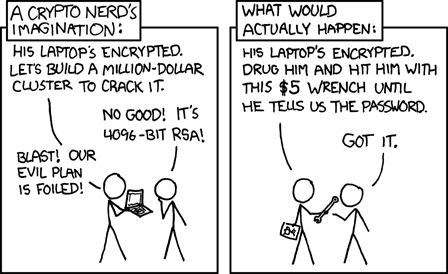Beware, cell phone users. Bringing your smartphone to an airport might open you up to a litany of security issues that might spill your personal data to the government:
A few months ago I wrote about how you can encrypt your entire life in less than an hour. Well, all the security in the world can’t save you if someone has physical possession of your phone or laptop, and can intimidate you into giving up your password.
And a few weeks ago, that’s precisely what happened to a US citizen returning home from abroad.
On January 30th, Sidd Bikkannavar, a US-born scientist at NASA’s Jet Propulsion Laboratory flew back to Houston, Texas from Santiago, Chile.On his way through the airport, Customs and Border Patrol agents pulled him aside. They searched him, then detained him in a room with a bunch of other people sleeping in cots. They eventually returned and said they’d release him if he told them the password to unlock his phone.
Sidd Bikkannavar’s hobbies include racing solar-powered cars. Photo by The Verge
Bikkannavar explained that the phone belonged to NASA and had sensitive information on it, but his pleas fell on deaf ears. He eventually yielded and unlocked his phone. The agents left with his phone. Half an hour later, they returned, handed him his phone, and released him.We’re going to discuss the legality of all of this, and what likely happened during that 30 minutes where Bikkannavar’s phone was unlocked and outside of his possession.
But before we do, take a moment to think about all the apps you have on your phone. Email? Facebook? Dropbox? Your browser? Signal? The history of everything you’ve ever done — everything you’ve ever searched, and everything you’ve ever said to anyone — is right there in those apps.“We should treat personal electronic data with the same care and respect as weapons-grade plutonium — it is dangerous, long-lasting and once it has leaked there’s no getting it back.” — Cory Doctorow
How many potentially incriminating things do you have lying around your home? If you’re like most people, the answer is probably zero. And yet police would need to go before a judge and establish probable cause before they could get a warrant to search your home.What we’re seeing now is that anyone can be grabbed on their way through customs and forced to hand over the full contents of their digital life.
Companies like Elcomsoft make “forensic software” that can suck down all your photos, contacts — even passwords for your email and social media accounts — in a matter of minutes. Their customers include the police forces of various countries, militaries, and private security forces. They can use these tools to permanently archive everything there is to know about you. All they need is your unlocked phone.
“If one would give me six lines written by the hand of the most honest man, I would find something in them to have him hanged.” — Cardinal Richelieu in 1641
What’s the worst thing that could happen if the Customs and Border Patrol succeed in getting ahold of your unlocked phone? Well…Think of all of the people you’ve ever called or emailed, and all the people you’re connected with on Facebook and LinkedIn. What are the chances that one of them has committed a serious crime, or will do so in the future?
Have you ever taken a photo at a protest, bought a controversial book on Amazon, or vented about an encounter with a police officer to a loved one? That information is now part of your permanent record, and could be dragged out as evidence against you if you ever end up in court.There’s a movement within government to make all data from all departments available to all staff at a local, state, and federal level. The more places your data ends up, the larger a hacker’s “attack surface” is — that is, the more vulnerable your data is. A security breach in a single police station in the middle of nowhere could result in your data ending up in the hands of hackers — and potentially used against you from the shadows — for the rest of your life.
Bringing your phone onto an airplane might finally be safe from the airlines’ perspective, but that doesn’t mean it’s smart for the individual. In an era where government surveillance is at its peak, it might be wise to leave your cell phone at home.
Source: Medium
Photo: XKCD


Yeah, right. People going on a trip will leave their cell phone at home.
Every comment I write is awaiting moderation. Then it is removed. What gives?
Moderate this.
Extreme vetting is simply for women and children of war torn countries seeking to save their families, not for Russian paid Trumpsters put in the White House to dismantle 240 years of democracy.
So you wanted Sharia Law in this country? That’s what you’d get if Hillary got the votes! http://100percentfedup.com/gruesome-video-muslim-mob-tears-27-year-old-woman-apart-killing-false-accusation-burning-quran/
^